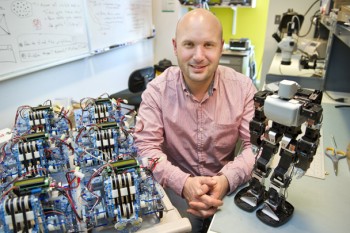
Professor Vona
On Thursday, March 20th, the University Scholars Seminar on Research and Innovation hosted a lecture by Marty Vona, Assistant Professor in the College of Computer and Information Science. Professor Vona is an experimental roboticist, who examines how computation interacts with the physical world. He received his MS and PhD degrees in electrical engineering and computer science from the Massachusetts Institute of Technology. Over the years, Professor Vona earned the 2004 NASA Software of the Year Award and the 2012 National Science Foundation (NSF) Faculty Early Career Development (CAREER). At Northeastern, he teaches Robotic Science and Systems, in which both undergraduate and graduate students team up to write software for and build practical robots that can lift objects off the floor.
In his talk, Professor Vona's shared with the University Scholars audience the milestone of his distinguished professional experience. Prior to pursuing his PhD, Prof. Vona spent two years at NASA’s Jet Propulsion Laboratory in California, where he was involved in creating the science operations software that put both the Spirit and Opportunity rovers on the surface of Mars. As a graduate student at the MIT Media Lab, Vona designed a climbing robot that could grab onto uneven surfaces and adjust its grip based on the dynamics of its initial contact. He then explained that mobility systems like those on the Mars rovers and the MIT climbing robot could be used on Earth to build robots that could travel over rubble after an earthquake or other disaster, or for driverless cars -- such as those Google is currently experimenting with.
Vona's current research merges his many academic interests and professional experiences. It involves system-level control of articulated, and sometimes self-reconfiguring, robots and mesoscale issues in compliant actuation and reliable sensing, which could help humans on Earth travel over very uneven ground, move along the sea floor — or even the surface of another planet — with ease, assist amputees traverse rocky trails, and eventually replace us in undertaking hazardous tasks. More specifically, Vona's research attempts to merge 3-D perception and compliant contact. His goal is to develop software through which a robot can acquire 3-D information about its surroundings, process the data and then approach the environment with a certain amount of “intelligence”. This eerie Matrix-like scenario originated a stimulating discussion between Vona and the University Scholars audience.
